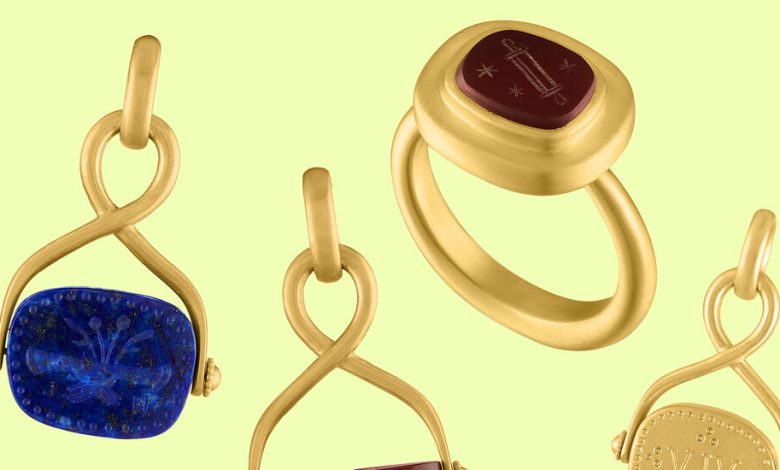It’s Engagement Season. Here’s What to Get Your Soon-to-Be Married Friends.

Set in Stone
Custom Carved Pendants and Rings

Prounis Intaglios in lapis, carnelian or gold, from $2,480, prounisjewelry.com.Credit…Courtesy of Prounis
By Caitie Kelly
The intaglio — a stone engraved with an image — is a form of jewelry that goes back to ancient Mesopotamia. “In the Greek and Roman galleries at the Met, there’s a study room that’s full of intaglios,” says the New York-based jewelry designer Jean Prounis. For just over a year, her namesake brand, which often references ancient decorative arts, has been creating personalized intaglios in lapis, carnelian, onyx, jade or gold that can be set as rings or spinning pendants. Once you’ve chosen which of the settings and stones to offer your giftee, Prounis will, she says, ask you or the betrothed a series of questions about the couple’s relationship before suggesting a design, which is then etched on the stone by a specialized intaglio carver. Or she’ll present a menu of options — among them, palm trees, clasped hands and olive branches. Prounis’s designs have also included pet portraits, initials and dates. “It’s kind of like an anthropological study of what modern-day people want to inscribe in stone,” she says. And for the newly engaged, an intaglio can also function as a wax seal: perfect for sending off invitations and thank-you notes.
love nest
Terence Conran’s Timeless Décor Advice
By Alice Newell-Hanson
First published almost 50 years ago, “The House Book,” by the pioneering British designer Terence Conran, remains a unique source for the kind of hyper-specific interiors knowledge — how to choose a wall color for a narrow corridor, how high to hang a painting above a sofa — that typically only exists in the heads of seasoned professionals. There are schematics for ideal kitchen layouts and taxonomies of floor coverings and door handles. And yet the book is also, somehow, sexy. The photographs of ’70s-era interiors that accompany the text include shots of London living rooms draped in Persian rugs and of people reclining on modular velvet sofas and bathing in terrazzo tubs. Conran, who founded the influential British furniture and design store Habitat, helped codify an approach to living informed by individuality and ease, and his vision of a home as a place filled with warmth and spontaneity feels like a perfect template for two people who are building one together. While the book is no longer in print, it’s still easy to find; a signed first edition costs $590 on Chairish, but Thriftbooks and eBay have gently used versions for around $20.
old flames
Parisian-Made Candlesticks Paired With Colorful Tapers
By Kurt Soller
I started shopping at Astier de Villatte, the Parisian company that manufactures milky ceramics by borrowing 18th-century techniques, after a couple I know who collects the stuff got engaged. But the brand’s candlesticks, which come in several sizes and motifs — from the twisty Peggy to the stolid Amalfi to the Canard, with its little duck — are a good idea for any couple. They’re sold individually, and offered at various heights and price points, so you can customize the gift in ways cheeky (a sinuous and squat one, say) or classic (a perfectly matched pair) or even get three (or more) for polyamorous folks. All are made in black terra cotta with a white enamel glaze; this season, the same bases are being incorporated into a new line of lamps (in case you want to buy something for yourself, too). But whatever you choose, don’t forget to include some candles. I like the thin, colorful Danica tapers. Or, if you prefer 100 percent beeswax, get the Taper Trio from Alysia Mazzella: With its upcycled fabric wrapping, you’ll have them thinking about “something new, something old, something borrowed, something blue” long before the wedding arrives.
TIE the Knot
A Lucky Charm to Hang at Home
By Mihoko Iida
In traditional Japanese folk art, there’s an ornament made using the straw from rice that has been harvested. The green stalks are braided into ropes that are then twisted into a large, intricate knot that can’t be undone called iwai musubi — iwai meaning celebration, and musubi, knot. According to the artisans of Warazaiku Takubo, a workshop in Miyazaki Prefecture, Japan, that specializes in these woven pieces, the iwai musubiis meant to symbolize firm unity. A couple can hang the knot inside their home as a lucky charm and a wish for peace, safety and prosperity. Visit any shrine in Japan and you’ll find tightly wound straw ropes marking the sacred areas to ward off evil spirits. The knots come in various shapes and sizes, but this one, made by Warazaiku Takubo and sold through the British shop Momosan, benefits from an added bit of symbolism: The tassels at the ends, called suehirogari in Japanese, flare outward, representing increased prosperity as time goes on.
brine art
An Everlasting Kitchen Companion
By Caitie Kelly
Salt may no longer be the luxurious commodity it once was (in ancient Greece, it was as valuable as gold), but its ubiquity means that every couple can use a salt vessel. Gift the Swedish designer Beata Heuman’s playful Monster Pinch bowl, inspired by sea creatures and made in Stoke-on-Trent, a city in England that has produced pottery since the mid-17th century. The double-sided Nabra bowl from the Brooklyn-based ceramist Dina Nur Satti allows for multiple seasonings to be close at hand, setting the scene for inspired cooking, while each of Jeremy Ayers’s Salt Boxes is made at his studio in Waterbury, Vt. — an 1870 barn where his great-great-grandfather crafted carriages and sleighs. Vintage salt cellars, like these snail-shaped ones from the 1980s, are available from resale sites like Chairish, 1stDibs and eBay, and can be found in all sorts of materials and forms. Whichever you choose, package them with an usual variety of the seasoning such as South Asian Black Mineral Salt, a seasoned version with lemon from Sicily or Tuscan herbs.



